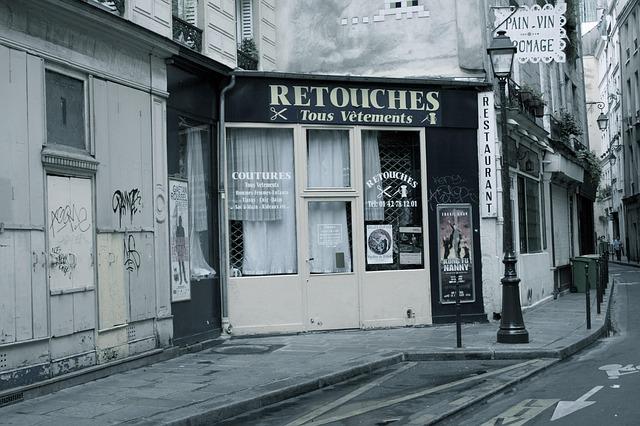Introduction
In the heart of Paris, a city renowned for its vibrant culture and historic charm, local shops are facing an unprecedented crisis. As overtourism swells, driven by a relentless influx of visitors, the landscape of the capital is shifting dramatically. Concurrently, rising real estate prices fueled by speculation are pushing many long-standing businesses to the brink of closure. This article delves into how these converging pressures are reshaping the retail environment in Paris, threatening the essence of its unique neighborhoods and the livelihoods of those who have called them home. As the streets become increasingly crowded with tourists and storefronts disappear under the weight of soaring rents, the question remains: can the City of Light preserve its distinctive character amidst these mounting challenges?
Impact of Overtourism on Local Retail in Paris
The vibrant streets of Paris, once a haven for local artisans and unique boutiques, are increasingly turning into a battleground between overtourism and the essence of community retail. As international visitors flood the city, the commercialization of neighborhoods has surged, driving up rental prices and pushing out smaller, independent shops. Established local businesses struggle to compete, while real estate speculation intensifies the pressure. Distinctive shops that have stood for generations risk disappearing as they are replaced by chains and souvenir stores tailored for tourists, diluting the authentic Parisian shopping experience.
Statistics highlight the stark reality of these shifts. In areas heavily frequented by tourists, retail rents have soared, often reaching levels that small businesses simply cannot afford. For instance, recent data shows that rents in popular districts have increased by over 30% in the last five years, driving out long-standing local stores. As a result, retail diversity is on a decline, leading to homogenized shopping streets where the charms of local craftsmanship are overshadowed by mass-produced goods. In the face of this crisis, both locals and visitors alike are calling for a more sustainable approach to tourism that prioritizes the preservation of Paris’s unique retail landscape.
Real Estate Speculation: A Threat to Small Businesses
The delicate balance of Parisian commerce is being disrupted by an accelerating trend in real estate speculation, primarily driven by investments targeting short-term rental markets. Small businesses are caught in a vice between soaring rents and diminishing foot traffic as residential properties are converted to lucrative tourist hubs. This shift not only threatens the economic viability of local shops but also dilutes the unique character of neighborhoods that attract both Parisians and visitors alike. The ripple effects of this trend contribute to a homogenization of the retail landscape, where multinational brands overshadow cherished local boutiques.
In the face of fierce competition, many small enterprises are left to grapple with escalating lease costs and the challenge of maintaining customer interest. The following factors are contributing to the crisis:
- Rising rents: Property owners prioritize short-term leases to tourists, often pricing out long-standing retail establishments.
- Decreased local clientele: With tourists flooding the streets, the daily presence of local shoppers has declined, impacting sales.
- Lack of regulations: Insufficient government intervention has left small businesses vulnerable to aggressive real estate practices.
Visualizing the landscape, a recent analysis highlights the disparity in rental costs between local businesses and tourist accommodations:
| Type of Property | Average Monthly Rent (Ōé¼) |
|---|---|
| Local Boutique | 2,500 |
| Short-Term Rental | 4,000 |
| Chain Store | 5,000 |
Strategies for Supporting Parisian Shops Amidst Economic Challenges
As Paris faces increasing pressures from overtourism and rising real estate costs, local shops find themselves caught in a relentless squeeze. To counter this trend, a multi-faceted approach is essential. Supporting independent retailers through community initiatives can create a stronger local economy. Consumers can be encouraged to prioritize purchasing from local artisans and boutique stores, fostering a culture of recurrent patronage. Additionally, the city could implement incentives for retailers to remain in economically vulnerable neighborhoods, ensuring that diverse shopping experiences remain available to residents and visitors alike.
To bolster the resilience of these shops, strategies focused on enhancing the retail environment are vital. Implementing temporary street markets and pop-up events can draw foot traffic and reinvigorate interest in local offerings. Collaboration between local businesses can also amplify marketing efforts, harnessing the power of joint promotions and shared events that increase visibility and attract a wider audience. Below is a table showcasing potential measures to foster support for Parisian shops:
| Strategy | Description |
|---|---|
| Community Events | Organize markets and festivals that highlight local artisans and food producers. |
| Digital Platforms | Create an online directory to promote local shops and their offerings. |
| Discount Programs | Introduce loyalty cards for patrons shopping locally to encourage repeat purchases. |
| Collaborative Advertising | Joint marketing campaigns that benefit multiple retailers in a neighborhood. |
Community Initiatives to Counteract the Effects of Mass Tourism
As the pressure of mass tourism and real estate speculation continues to undermine the local economy, various community initiatives have emerged to promote sustainable practices. Local business associations are at the forefront, advocating for regulations that limit short-term rentals and provide tax incentives for long-term residential leasing. These organizations aim to retain the cityŌĆÖs charm while fostering a more authentic visitor experience. Additionally, grassroots movements have initiated awareness campaigns to educate tourists about responsible travel and its impact on local cultures, emphasizing the importance of supporting businesses that prioritize sustainability.
Collaborative projects between residents and local authorities have also gained traction, such as the establishment of community markets and cultural festivals designed to celebrate local artisans and promote small businesses. These events not only provide a platform for local entrepreneurs but also create an inclusive environment for both tourists and residents. To further counteract the adverse effects of tourism, initiatives focusing on environmental conservation, such as clean-up drives and tree-planting events, have been organized, fostering a sense of community ownership and stewardship towards the cityŌĆÖs future.
Final Thoughts
In conclusion, the challenges faced by Parisian shops amid the dual pressures of overtourism and escalating real estate speculation underscore a complex and urgent dilemma for the city’s small businesses. As the allure of the French capital continues to draw visitors from around the globe, local merchants are finding it increasingly difficult to sustain their livelihoods. The rising costs of rent, fueled by investor interest and a booming short-term rental market, threaten not only the diversity and character of Paris’s neighborhoods but also the very essence of community that these shops foster.
As the debate surrounding sustainable tourism and responsible urban development intensifies, stakeholdersŌĆöincluding policymakers, business owners, and residentsŌĆömust collaborate to ensure that the soul of Paris is preserved for future generations. Without concerted action, the vibrant tapestry of this iconic city risks being irreparably altered, leaving both locals and visitors to wonder what might be lost in the relentless pursuit of profit.




